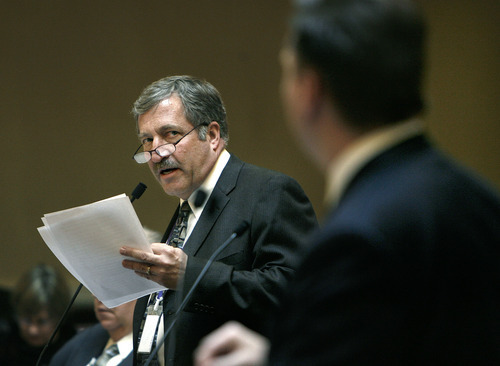This is an archived article that was published on sltrib.com in 2011, and information in the article may be outdated. It is provided only for personal research purposes and may not be reprinted.
Ogden's veteran Police Chief Jon Greiner was reluctantly terminated Wednesday, the outcome of a five-year battle with federal authorities over violations of the Hatch Act.
Ogden was facing a Friday deadline to appeal a federal Merit System Protection Board ruling that Greiner had violated the 70-year-old law by running for a Utah State Senate seat while holding a municipal position that applies for, or oversees, federal grant money.
Greiner was elected to the Senate in 2006. The Utah Democratic Party filed a complaint with federal officials, citing the Hatch Act. The police chief dropped his bid for reelection in 2010 after an administrative law judge ruled he had violated the act.
Ogden appealed to the merit board in April 2010. Last month, the board said the city must fire Greiner or face sanctions that could amount to hundreds of thousands of dollars.
Greiner has been a member of the Ogden Police Department since 1973. In 2005, he received the Utah "Chief of the Year" award. He has been lauded by Ogden officials for lowering the town's crime rate with innovative policing.
The decision on whether to appeal the Merit System Protection Board's ruling in federal court was up to Ogden Mayor-elect Mike Caldwell. He doesn't take office until next week.
The decision was "frustrating," Caldwell said late Wednesday afternoon.
"This is heartbreaking for me and Chief Greiner and his family," he said. "And it's very unfair to the citizens of Ogden."
But the mayor-elect said to fight the board's ruling through federal court would take years and cost a lot of taxpayer money. And even then, the outcome would be uncertain.
"The law is so muddy and the people making the judgments are so unclear," Caldwell said. "Everybody looked at all the options. It's been a full-court press. Unfortunately, it was unfair. But at the end of the day, it just wasn't there."
Greiner could not be reached for comment late Wednesday. But his Salt Lake City-based attorney, James Bradshaw, called the outcome "an incredible injustice" born out of a "political hatchet job."
"There is no one who could criticize Chief Greiner as a police officer or call into question his fitness to serve as chief," Bradshaw said. "No one can say we're better off for this."
After having fought the decision for five years at a considerable cost for taxpayers, it was time to throw in the towel, Ogden City Councilwoman Amy Wicks said. She was unsure of the exact cost, but said it could be in the hundreds of thousands of dollars.
"We were put into a difficult position and we've spent a lot of money defending this," she said. "He's been a good police chief, but you come to the point where you have to decide what's best for the community. Spending a lot of money defending this in court is not in the best interest of the community."
As chief, Greiner instituted new programs and strategies. In 2007, when statistics showed one-quarter of the city's crime was committed within the heart of the city that includes Ogden's historic 25th Street, Greiner persuaded Ogden's City Council to spend $250,000 to hire and equip six new officers assigned to prevent crime in that neighborhood.
In 2010, at Greiner's urging, the Weber County attorney filed an injunction that limits the movements of members of the gang Ogden Trece. Defense attorneys and the American Civil Liberties Union continue to fight the gang injunction, but injunction supporters have won early court battles.
Then, this year, Ogden police began operating a crime center that monitors some 200 surveillance cameras from across the city and connects police with various crime databases.
Ogden had 93 serious crimes per 1,000 residents in 1997. By 2009, the rate fell to about 62 crimes, according to data from the Utah Department of Public Safety.
Tribune reporter Nate Carlisle contributed to this story.



